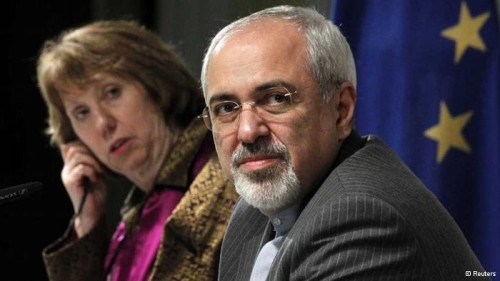LATEST
- Head of Revolutionary Guards: Islamic Revolution Inspired Yemeni “Resistance”
- Rouhani Declares “We Recognize Right to Protest for All”
- Head of Armed Forces Draws Iran’s “Red Lines” For Nuclear Agreement
As Iran and the 5+1 Powers draft the text of a final nuclear agreement, Iranian Foreign Minister Mohammad Javad Zarif has declared progress to meet a June 30 deadline.
Zarif wrote on Twitter on Monday:
Drafting #IranDeal is moving forward. Hard work, and many brackets, remain. Determined to end this manufactured crisis & open new horizons.
— Javad Zarif (@JZarif) May 3, 2015
Iran’s lead negotiator, Deputy Foreign Minister Abbas Araqchi, and the European Union’s deputy foreign policy head, Helga Schmid, began the drafting with a total of 24 hours between Thursday and Saturday in New York.
Iranian officials said agreement on a single word could take hours, and Araqchi cautioned that gaps — Zarif’s “many brackets” — would remain in the document when it was presented for negotiation between Iran and the 5+1 (US, Britain, France, Germany, China, and Russia).
The Deputy Foreign Minister has said that talks will continue until Tuesday in New York and then move to Europe.
Before the drafting began, Zarif met US Secretary of State John Kerry on the sidelines of a UN conference on the Nuclear Non-Proliferation Treaty. He then did an interview on US national television and replied to criticism from Senator Tom Cotton, who organized a warning letter by 47 Republican Senators to Tehran, about his “cowardly character”.
The leading issue in the discussions is the timing of the removal or suspension of US, UN, and European Union sanctions in return for Iran’s limits on its nuclear facilities and enrichment of uranium.
Head of Revolutionary Guards: Islamic Revolution Inspired Yemeni “Resistance”
Continuing Iran’s PR campaign over Yemen’s civil war, the head of the Revolutionary Guards, General Mohammad Ali Jafari, has declared that “the resistance shown by the Yemeni people to foreign invasion as a new achievement of the Islamic Revolution and its inspiring role”.
On Sunday, Saudi-led intervention, which began with airstrikes in late March, expanded with Sudanese and UAE troops fighting Ansar Allah (Houthi) members near the airport in the southern port city of Aden. The ground operations were accompanied by sustained bombing of the airport.
Ansar Allah took control of the Yemeni capital Sanaa in February, forcing President Abdrabuh Mansour Hadi to flee. Iran has provided political and economic support for Ansar Allah, and it is claimed that Tehran has also supplied weapons and military advisors.
Jafari said “the Yemeni people’s fortitude and resistance to the hegemonic system” was part of the failure of “regional and trans-regional enemies” to undermine Iran’s leadership in the region: “Today, the friends and foes have come to the conclusion that military-security threats against the Islamic Revolution do not work.”
Rouhani Declares “We Recognize Right to Protest for All”
Responding to teachers’ demonstrations for better wages and conditions, President Rouhani has insisted that “his government recognizes the right to protest for people of all walks of life”.
The President was addressing a gathering in Tehran to celebrate National Teacher’s Day.
Thousands of teachers have been protesting in recent weeks, including in front of Government buildings. Iranian authorities have not blocked all demonstrations, but they have detained a number of labor leaders, including the summons of the head of the Teachers Organization to serve a five-year prison sentence.
Rouhani reassured the crowd by saying that Iranian workers had been allowed for the first time to hold a rally on May Day.
Head of Armed Forces Draws Iran’s “Red Lines” For Nuclear Agreement
In a lengthy statement on Sunday, the head of Iran’s armed forces, General Hassan Firouzabadi, has redrawn Iran’s “red lines” for a final nuclear agreement.
Firouzabadi restated support for Iran’s negotiators, including Foreign Minister Mohammad Javad Zarif, but warned them “to take good care not to be trapped” in talks with the US.
The general upheld Iran’s line that military facilities should not be subject to unlimited access by the International Atomic Energy Agency, as this would challenge “Iran’s defense and security affairs under the pretext of nuclear supervision and inspection”: “Iranian military officials are not allowed to let the foreigners go through the country’s security-defense shield and fence.”
That issue is unlikely to block a final agreement by June 30, as “Possible Military Dimensions” are not a priority issue for the 5+1 Powers (US, Britain, France, China, Russia, and Germany).
More significant was Firouzabadi’s declaration, “Iran’s national security necessitates guaranteed irreversibility of the sanctions removal and this is no issue for bargaining, trade or compromise.”
Iranian officials have insisted that sanctions must be lifted in full upon signature of the agreement. The US has said that removal or suspension is conditional on IAEA verification of Iranian compliance with the terms.

